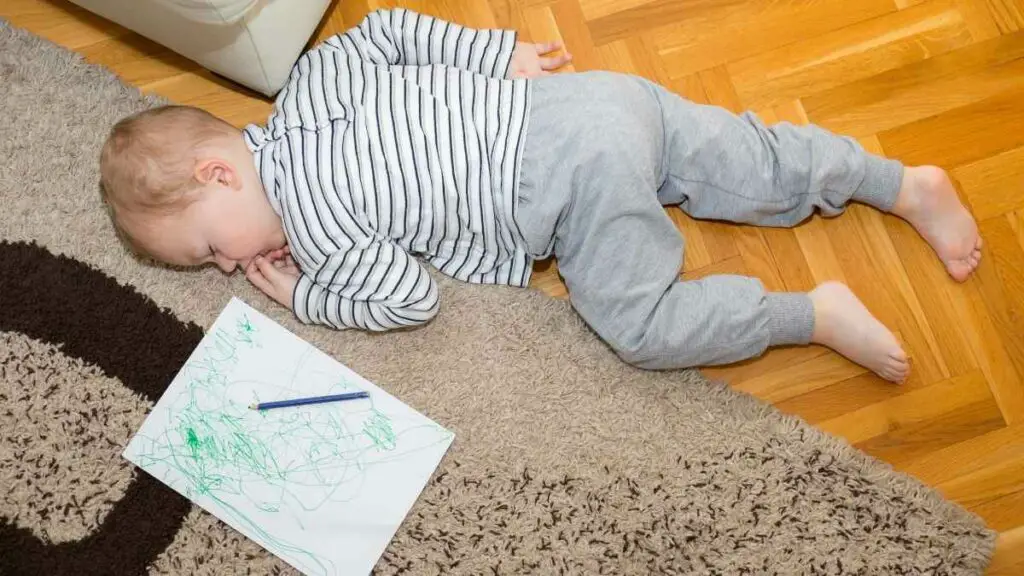When children peacefully close their eyes and drift off to sleep, restorative magic unfurls within their tiny bodies. Deep in sleep, integral functions like processing, restoration, and strengthening take center stage, paving the path for health and development in multiple spheres.
The significance of sleep extends far beyond merely being a dormant period for rest. It ingrains itself in a child’s physical, emotional, and cognitive development, promoting the necessity to establish healthy sleep habits from an early age.
This monumental journey through understanding the role of sleep, recognizing children’s sleep patterns, the impact of sleep deprivation, and fostering healthy sleep habits can empower parents and caregivers with the knowledge needed to nurture their little ones’ well-being.
Understanding the Role of Sleep for Children
The Power of Snooze: Unfolding the Importance of Sleep for Children
A home is more than just four walls and a roof. It’s a place filled with laughter, joy, occasional squabbles, and an unmistakable sense of warmth from a loving family. Central to this harmonious atmosphere is the health and happiness of our children. Unexpectedly, something as simple as sleep can significantly affect their overall well-being. So, let’s discuss why a good night’s kip is crucial for our precious little ones.
Contrary to popular belief, sleep is far from passive activity. It’s an intricate process that actively influences various aspects of our children’s health, mentally and physically. When children slumber, their bodies get busy with crucial tasks like growth, restoration, and memory consolidation.
An undisturbed, appropriate amount of sleep plays a pivotal role in the growth of our children. During deep sleep, the Growth Hormone (GH) is vigorously secreted. This hormone is essential for the healthy development and repair of children’s body tissues, including muscles and bones – making them grow taller and stronger.
Brain development is another significant area where sleep plays a starring role. During sleep, especially the REM (Rapid Eye Movement) stage, the brain is hard at work, organizing and storing information gathered during the waking hours. It helps cement new knowledge, ensuring it is properly stored for future recall. This is essential for our children’s learning and cognitive development, ensuring that all those after-school lessons, bedtime stories, and dinner table discussions find a permanent space in their brains.
Even the emotional well-being of children is closely intertwined with sleep. Isn’t it a common observation that a well-rested child is more cheerful, alert, and ready to confront the day? Adequate sleep can help manage mood swings, reduce irritability, and cultivate a positive temperament.
-

Bold Male Pride – Baseball Trucker Cap Celebrating Masculinity
£18.00 Select options This product has multiple variants. The options may be chosen on the product page -

Dad Bod Appreciation Gift Mug
£14.00 Add to cart -

Dad Bod, Bad Jokes Structured Baseball Cap
£22.00 Select options This product has multiple variants. The options may be chosen on the product page
Moreover, the immune system gets a significant boost from sound sleep. It’s like charging up your child’s health battery, helping prevent common infections and keep the doctor away.
If that wasn’t enough, sleep also regulates a child’s appetite and metabolism. Inadequate sleep can disrupt the balance of hormones that control hunger, consequently leading to overeating, unhealthy cravings, and the potential risk of obesity.
Understanding the profound influence sleep has on children’s health. Parents must prioritize fostering healthy sleep habits from an early age. Regular and consistent sleep routines, a sleep-conducive environment, and parental modeling of good sleep habits can significantly aid a child’s overall health and well-being.
Turning off screens well before bed, reserving the bed for sleep only, setting a calming pre-sleep routine such as reading a storybook, and ensuring the room is dark, quiet, and cool can contribute towards better sleep hygiene.
Though it might just seem like ‘nap time’, the world of sleep is paramount in creating a foundation for our children to grow into healthy, happy individuals,; ensuring they catch enough zzz’s is the secret ingredient to their development soup, contributing richly towards their cognitive, physical, and emotional growth. It’s the magic potion for our little ones, spelling wonders. So, here’s to more cozy bedtimes and sweet dreams!

Know More About Your Child’s Sleep Pattern
Weaving the story of our little ones’ sleep stages and patterns can be an enlightening journey. We’re all aware of the importance of those precious winks, but when it comes to their intricacies, many fascinating details often go unnoticed. For parents keen on understanding their child’s sleep patterns better, here’s a deeper look into the world of their peaceful slumbers.
One of the key aspects of children’s sleep lies in their sleep stages. Just like adults, children also pass through four stages of sleep, each with its unique characteristics. The first and second stages, already in light sleep, act as transitions between wakefulness and sleep. During these stages, the magic of sleep begins, with blood pressure dropping and body temperature reducing.
But the real magic unfolds in stages three – deep or slow-wave sleep and REM -rapid eye movement sleep. Stage three is crucial for physical rest and recovery. This is when the body releases growth hormones, aiding in cell repair bone, and muscle growth. As for REM sleep, it’s the home of dreams, playing a vital role in memory and learning.
The distribution of these stages changes, however, as children grow. Infants spend about 50% of their sleep in the REM stage, which drops to about 25% during adolescence. This dynamic fluctuation reflects the brain development and maturation changes children undergo as they age.
On the other hand, sleep patterns, which outline the timing and duration of sleep, can offer notable insights, too. Babies, with their frequent feeding needs, tend to have fragmented sleep. But as they grow and their stomachs enlarge, they start sleeping for more extended periods. By six months, most babies begin developing circadian rhythms, helping establish the commonly understood day-night sleep pattern.
One adorable spectacle that parents might notice is their child’s fluctuating sleep needs over childhood. Newborns require about 16-18 hours per day, while a toddler needs approximately 11-14 hours, including naps, the numbers further dipping for school-aged children and teenagers.
Sleep has a profound influence on children’s health and well-being. Understanding sleep stages and patterns can be a powerful tool for parents, aiding them in creating healthy sleep environments and appreciating their children’s unique sleep needs. Remember, like each child is unique, so are their sleep patterns and stages. Embrace and adapt to these changes, and watch as pleasant dreams pave the way for a healthy, energetic tomorrow.

The Impact of Sleep Deprivation on Children
The Unseen Consequences of Sleep Deprivation in Children
As parents, we ensure our children eat balanced meals, do their homework, and brush their teeth before bedtime. However, another essential aspect of their well-being often slips under the radar – sleep. Beyond its common associations with rest and relaxation, sleep is a complex, active, and crucial part of our children’s lives. Understanding what happens when our little ones don’t get enough shut-eye can help us prioritize and support their sleep health more effectively.
When children consistently miss out on their essential hours of sleep, their academic performance can take a blow. Studies have found that sleep can hinder concentration, creativity, problem-solving skills, and overall learning abilities. Our children find it more difficult to absorb new information at school, which increasingly builds up a knowledge deficit over time. The link between sleep deprivation and academic setbacks urges us to ensure our kids get enough sleep to support their learning endeavors.
Lack of sleep can also disrupt our children’s behavior and social interactions. Have you ever noticed your kiddo being more irritable, hyperactive, or resistant after a late night? These are not random occurrences. Sleep deprivation can trigger mood swings, problems with impulse control, and higher instances of behavior issues. This can trickle down to strained relationships, causing peer and teacher clashes.
Moreover, insufficient sleep can also pose severe safety risks. Like adults, kids can experience microsleep episodes – brief, involuntary instances of inattention – when they’re chronically sleep-deprived. This can lead to accidents, injuries, and other safety hazards, especially in teens beginning to drive.
Not meeting the recommended sleep requirements can also pave the way for long-term health problems. Emerging research indicates that persistent sleep deprivation in children could be linked to higher risks of developing conditions like diabetes, hypertension, and heart disease in their later lives.
As we navigate our parenting journey, an important point of reflection is how we can better support and encourage healthy sleep habits. You’ve been doing an amazing job addressing diet, education, and all the other aspects of your child’s healthy upbringing. Now, it’s time to focus on improving our children’s sleep health – because every good day starts with a good night’s sleep.
So, let’s ensure our kids head to bed early, limit their screen time, quieten the environment, and instill regular bedtime routines. These steps, alongside understanding our child’s individual sleep patterns, can give our little ones the refreshing relaxation they need. After all, helping them get the sleep health they deserve is a blissful investment in their joyful and successful future.

Promoting Healthy Sleep Habits
Now, let’s take it further and examine how parents can promote positive sleep behaviors in their children. Being active participants in our children’s bedtime routines aids in establishing long-term healthy sleep habits. Involvement is key here.
To start, it’s beneficial to create an environment conducive to sleep. Children should associate their bedrooms with relaxation and rest. Avoid intense activities or games in these rooms, which might make children associate this space with excitement rather than calm. For instance, use the bedroom for sleepy storytimes, soft chats, or listen to quiet, soothing lullabies together.
Furthermore, using noise-canceling devices or white noises can be advantageous, especially for children who struggle to fall asleep in a disruptive environment. These devices drown out environmental sounds and provide a calming ambiance, such as raindrops or gentle waves, to help induce sleep.
In addition, diet directly impacts sleep quality. A diet abundant in processed foods high in sugar can excessively stimulate children, leading to disturbed sleep. Establish healthy eating habits, which include reducing sugar intake, especially closer to bedtime.
Exercise also plays a significant role, as it enhances sleep quality and promises a good rest at night. Ensuring that children participate in active play during the day can positively influence their sleep.
Be mindful of your child’s emotional state before bedtime. Stress-related issues can lead to sleep problems. Open discussions about worries or fears can help alleviate anxiety. Incorporating relaxation techniques, like deep breathing, can also guide children towards more relaxed states, making sleeping easier.
Remember, consistency is vital in sleep health. Maintain regular sleeping and waking up times, even on weekends. This regularity will set the body’s ‘internal clock’ to expect sleep at certain times.
Occasionally, despite investing effort in these strategies, sleep problems may persist. Parents must not hesitate to seek professional help. Sleep disorders in children are not always a phase and could indicate an underlying issue.
Finally, let’s not forget how crucial our roles as parents are. Our children often mirror our actions – if we prioritize and respect our sleep, they are likely to do so, too. It’s a practice of imparting more than just information, values, and health-conscious behaviors.
Promoting good sleep habits in children isn’t an overnight process. It requires patience and consistency. But rest assured (pun intended), your efforts will have long-term benefits for both your child’s health and your peaceful nights.

Sleep plays a crucial role in a child’s life, contributing immensely to their physical, emotional, and cognitive growth. Recognizing the rhythms of their sleep patterns and being conscious of the detrimental effects of sleep deprivation can guide them to prioritize and value their sleep-filled moments. An indispensable guidepost in this journey is the promotion of healthy sleep routines.
Whether it’s making a tranquil, sleep-friendly environment, setting consistent bedtimes, or efficiently handling sleep obstacles, each step adds to the child’s well-being. Being aware, proactive, and responsive to a child’s sleep needs can enhance their overall health and development, enriching the building blocks of their future.
Hence, we must impart the significance of sleep to our young ones, helping them embrace it not as a mere necessity but as a pathway to well-being and growth.



